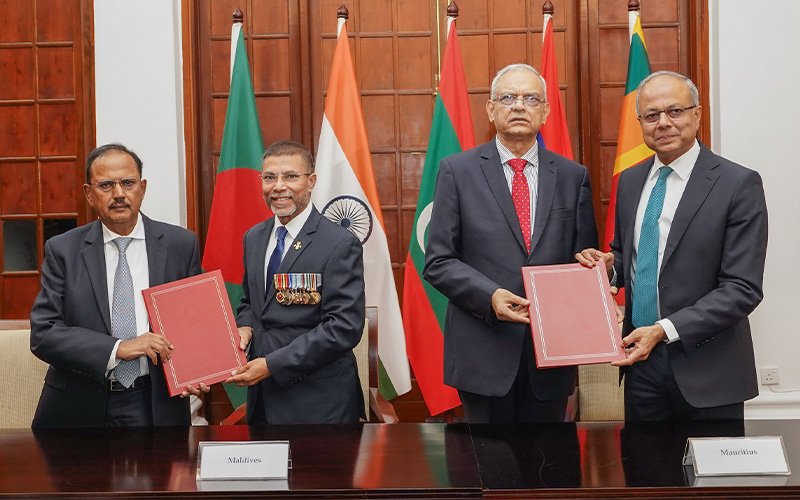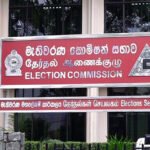
President Meets Indian National Security Advisor Ajit Doval

- Charter & MoU for Establishing the Colombo Security Conclave Secretariat Signed.
- Managing Internal Challenges Caused by Technological Advancements Falls Under National Security- Chief of Staff to the President and Senior Advisor on National Security Sagala Ratnayaka.
A crucial meeting between Indian National Security Advisor Mr. Ajit Doval and President Ranil Wickremesinghe unfolded this morning at the Presidential Secretariat in Colombo. The discussions centred around enhancing economic cooperation, strengthening defence ties, and fostering regional collaboration between the two neighbouring nations.
The meeting underscored the importance of the strategic partnership between India and Sri Lanka, exploring avenues to deepen economic engagement and fortify defence cooperation. The dialogue also touched on broader regional issues, reflecting the shared interests and common challenges faced by the two countries in maintaining stability and security in South Asia.
Chief of Staff to the President and Senior Advisor on National Security Sagala Ratnayaka, also attended the meeting, contributing to the discussions that are expected to further solidify the relationship between India and Sri Lanka.
Meanwhile, the Member States of the Colombo Security Conclave (CSC) – Sri Lanka, India, Maldives, and Mauritius signed the Charter and Memorandum of Understanding (MoU) for the establishment of the CSC Secretariat this afternoon (30) at the Presidential Secretariat.
Indian National Security Advisor Mr Ajit Doval K C; National Security Advisor of Maldives Mr. Ibrahim Latheef, DC (Retd.), Lt Col (Retd.);
High Commissioner of the Republic of Mauritius to Sri Lanka H.E. Haymandoyal Dillum, and Senior Advisor to the President on National Security of Sri Lanka Mr. Sagala Ratnayaka, signed the documents on behalf of the respective Member States.
Addressing the ceremony, Senior Advisor to the President on National Security of Sri Lanka Mr. Sagala Ratnayaka emphasized that the scope of national security now extends beyond external threats to include the management of internal challenges arising from technological advancements. He highlighted the need for governments to take more practical approaches in addressing the negative effects of freedom of expression in the current digital age, while recognizing it as a fundamental right.
The CSC s core objective is to promote regional security by addressing transnational threats and challenges of common concern to the Member States. There are five pillars of cooperation under the CSC namely Maritime Safety and Security; Countering Terrorism and Radicalisation; Combating Trafficking and Transnational Organised Crime; Cyber Security and Protection of Critical Infrastructure and Technology; and Humanitarian Assistance and Disaster Relief.
Addressing the gathering Mr. Sagala Ratnayaka further elaborated:
It is with great pleasure that I welcome our esteemed colleagues and delegations to Sri Lanka for the momentous occasion of signing the founding documents of the Colombo Security Conclave. Today, we gather in Colombo, united by our shared commitment to regional security and cooperation. This historic event offers us yet another opportunity to deepen our formal commitment to the principles of this esteemed Conclave upholding a common strategic vision, emphasizing the importance of resisting escalating external influences in the region, and fostering collaboration while averting conflicts with neighbouring countries.
Since its inception in 2011, the Colombo Security Conclave, originally established as trilateral maritime security cooperation between India, the Maldives, and Sri Lanka, has successfully navigated through numerous challenges and achieved significant progress. We are now fortunate to have Mauritius and Bangladesh as active members, with the Seychelles invited to join as well. The unwavering cooperation among our member states is a testament to our resilience in adversity and our dedication to maintaining peace in the region.
Sri Lanka is honoured to host this event, particularly as the home to the permanent Secretariat of the Colombo Security Conclave. This demonstrates our commitment to addressing the complex security challenges that impact us all. Our collective dedication to the five fundamental pillars and objectives of the Conclave will be instrumental in shaping a future where peace, stability, and prosperity are not just aspirations, but realities.
In a rapidly changing world with evolving threats, our efforts must focus on strengthening regional partnerships, sharing intelligence, and developing collaborative strategies. It is imperative that we address traditional security concerns while confronting emerging threats that transcend borders, such as cyber security, transnational crime, and maritime security.
Moreover, I want to touch upon the recent experiences of Sri Lanka, a country that has just emerged from an economic crisis. During this period, we witnessed weeks of violence in the streets of Colombo, and Bangladesh has also faced its own challenges. Sri Lanka has a deeply ingrained social welfare system, with successive governments committed to serving the people. However, over time, financing these welfare programs became increasingly difficult, leading to unsustainable borrowing. This culminated in a government that made election promises to reduce taxes and implement a 100% chemical-free agriculture policy. These promises were delivered, but the consequences were dire, leading to a financial crisis where the government struggled to service loans and fund day-to-day activities. The situation escalated to the point of printing money, ultimately resulting in unrest and uprisings, fuelled by the rapid dissemination of information through technology.
National security now extends beyond external threats to include the internal challenges posed by technological advancements and the management of such advancements. While freedom of expression is a fundamental right, managing its impact in the digital age is a delicate balance that governments must navigate.
As we move forward, it is crucial that we share our experiences and insights to develop solutions that are both innovative and practical. By leveraging our collective expertise, we can build a sustainable framework that supports security and fosters deeper regional integration.
I urge you to seize this opportunity to strengthen our commitment to securing a prosperous future, forging stronger bonds that will lead us into a future defined by mutual respect and collaboration for the benefit of our peoples.
I would like to extend my sincere thanks to everyone involved in organizing this event in such a short time. The efforts of the foreign ministers, the Foreign Secretary, the Office of the National Security Advisor, the Colombo Security Conclave Secretariat, the various missions, and the respective governments have been remarkable. The swift approvals and coordination are unheard of in this part of the world, and I am deeply grateful to all.
Following the ceremony, Indian National Security Advisor Mr Ajit Doval K C; National Security Advisor of Maldives Mr. Ibrahim Latheef, DC (Retd.), Lt Col (Retd.); High Commissioner of the Republic of Mauritius to Sri Lanka H.E. Haymandoyal Dillum, and Senior Advisor to the President on National Security of Sri Lanka Mr. Sagala Ratnayaka engaged in a special discussion.



